1. Early life and background
Mamata Banerjee was born in Calcutta (now Kolkata), West Bengal, India, into a Bengali Hindu Brahmin family. Her parents were Promileswar Banerjee and Gayetri Devi. She grew up in a lower-middle-class family. Her father, Promileswar, died when she was 17 years old due to a lack of medical treatment.
1.1. Childhood and education
Banerjee completed her higher secondary board examination in 1970 from Deshbandhu Sishu Sikshalay. She earned a bachelor's degree with honors in history from Jogamaya Devi College, an all-women's graduation college in South Kolkata. Later, she obtained a master's degree in Islamic history from the University of Calcutta. She also holds a degree in education from Shri Shikshayatan College and a law degree from Jogesh Chandra Chaudhuri Law College in Kolkata.
In 1984, Mamata Banerjee began prefixing her name with "Dr." claiming to have completed her doctorate from the University of East Georgia. However, after it was revealed that this university did not exist, she ceased using the "Dr" title. She has since received several honorary doctorates, including a D.Litt. in Literature from St. Xavier's University, Kolkata on 6 February 2023, another from Calcutta University on 12 January 2018, and an honorary doctorate from the Kalinga Institute of Industrial Technology in Bhubaneshwar.
1.2. Early political involvement
Banerjee became involved in politics at the young age of 15. While studying at Jogamaya Devi College, she founded the Chhatra Parishad Unions, the student wing of the Congress (I) Party. Through this, she successfully challenged and defeated the All India Democratic Students Organisation, which was affiliated with the Socialist Unity Centre of India (Communist). She continued her involvement with the Congress (I) Party in West Bengal, holding various positions within the party and other local political organizations. As a young woman in the 1970s, she quickly rose through the ranks, serving as the state general secretary of the Mahila Congress (Indira) from 1976 to 1980.
2. Political career before Chief Ministership
Mamata Banerjee's political journey before assuming the role of Chief Minister of West Bengal was marked by her rise within the Indian National Congress and her subsequent departure to form her own party, the Trinamool Congress, which she built into a formidable opposition force through a series of significant movements.
2.1. Indian National Congress era (1970s-1997)
Banerjee began her political career with the Congress party in the 1970s. She gained public attention in 1975 when she protested against socialist activist and politician Jayaprakash Narayan by dancing on his car. Her bold and unconventional methods contributed to her rapid ascent within the party.
2.1.1. Rise to prominence and early roles
In the 1984 Indian general election, Banerjee achieved a significant victory, becoming one of India's youngest parliamentarians ever. She defeated the veteran Communist politician Somnath Chatterjee to win the Jadavpur parliamentary constituency in West Bengal. In the same year, she was appointed General Secretary of the Indian Youth Congress. Although she lost her seat in the 1989 Indian general election amidst an anti-Congress wave, she was re-elected in the 1991 Indian general election from the Kolkata South constituency. She successfully retained the Kolkata South seat in subsequent general elections in 1996, 1998, 1999, 2004, and 2009.
In 1991, during the government of Prime Minister P. V. Narasimha Rao, Mamata Banerjee was appointed Union Minister of State for Human Resources Development, Youth Affairs and Sports, and Women and Child Development. As Sports Minister, she famously announced her resignation and protested at the Brigade Parade Ground in Kolkata, criticizing the government's perceived indifference to her proposals for sports development. She was relieved of these portfolios in 1993. In April 1996, she publicly accused the Congress of acting as a "stooge" of the Communist Party of India (Marxist) (CPI-M) in West Bengal, advocating for a "clean Congress."
2.1.2. Key incidents and protests
In December 1992, Mamata Banerjee brought Dipali Basak, a physically challenged girl who was allegedly raped by a CPI(M) cadre, to the Writers' Building to meet the then Chief Minister Jyoti Basu. However, Banerjee was reportedly harassed by the police before being arrested and detained. Following this incident, she famously vowed that she would only re-enter the Writers' Building as Chief Minister.
On 21 July 1993, the State Youth Congress, led by Mamata Banerjee, organized a protest march to Writers' Building in Kolkata. Their demand was that voter ID cards should be the sole document required for voting, aiming to curb what they termed as "scientific rigging" by the CPI(M). During this protest, thirteen people were shot and killed by police, and many others were injured. In response, then-Chief Minister Jyoti Basu controversially stated that the "police had done a good job." However, a 2014 inquiry led by Justice (retired) Sushanta Chatterjee, a former Chief Justice of the Orissa High Court, described the police response as "unprovoked and unconstitutional," concluding that the case was "even worse than Jallianwala Bagh massacre." This incident became a significant rallying point for Banerjee and the opposition against the Communist government, highlighting severe human rights concerns.
2.2. Founding and leading the Trinamool Congress (1997-2011)
In 1997, due to significant political disagreements with Somendra Nath Mitra, who was then the president of the West Bengal Pradesh Congress Committee, Mamata Banerjee left the Congress Party in West Bengal. She, along with Mukul Roy, became one of the founding members of the All India Trinamool Congress. The party quickly established itself as the primary opposition to the long-standing Communist government in the state. In a notable incident on 11 December 1998, she controversially held a Samajwadi Party MP, Daroga Prasad Saroj, by the collar and pulled him out of the well of the Lok Sabha to prevent his protest against the Women's Reservation Bill.
2.2.1. Union Minister roles
In 1999, the Trinamool Congress joined the BJP-led National Democratic Alliance (NDA) government, and Mamata Banerjee became the Minister of Railways. In 2000, she presented her first Railway Budget, fulfilling many promises to her home state of West Bengal. She introduced a new biweekly New Delhi-Sealdah Rajdhani Express train and four express trains connecting various parts of West Bengal, including the Howrah-Purulia Rupasi Bangla Express, the Sealdah-New Jalpaiguri Padatik Express, the Shalimar-Adra Aranyak Express, the Sealdah-Ajmer Ananya Superfast Express, and Sealdah-Amritsar Akal Takht Superfast Express. She also increased the frequency of the Pune-Howrah Azad Hind Express and extended at least three express train services. Work on the Digha-Howrah Express service was expedited during her brief tenure. She also focused on developing tourism, arranging two additional locomotives for the Darjeeling Himalayan Railway section and proposing the Indian Railway Catering and Tourism Corporation Limited. She advocated for India's role in the Trans-Asian Railway and the reintroduction of rail links between Bangladesh and Nepal. In total, she introduced 19 new trains for the 2000-2001 fiscal year. In 2000, she and Ajit Kumar Panja briefly resigned in protest of petroleum price hikes but later withdrew their resignations without explanation.
In early 2001, after Tehelka exposed Operation West End, which revealed corruption charges against senior government ministers, Banerjee withdrew from the NDA cabinet and allied with the Congress Party for West Bengal's 2001 elections. She returned to the NDA government in September 2003 as a cabinet minister without portfolio, with her party colleague Sudip Banerjee also being inducted into the Vajpayee ministry. On 9 January 2004, she took charge as the Minister of Coal and Mines. During her short term, her government disallowed the sale of the National Aluminium Company. She held these portfolios until 22 May 2004.
In the 2004 Indian general election, her party allied with the Bharatiya Janata Party, but the alliance lost, and she was the only Trinamool Congress member elected from West Bengal. She faced further setbacks in 2005 when her party lost control of the Kolkata Municipal Corporation and mayor Subrata Mukherjee defected. In 2006, the Trinamool Congress was defeated in West Bengal's Assembly Elections, losing over half its sitting members. On 4 August 2006, Banerjee drew attention by throwing her resignation papers at the Deputy Speaker Charanjit Singh Atwal in the Lok Sabha. This was in protest of Speaker Somnath Chatterjee's rejection of her adjournment motion concerning alleged illegal infiltration by Bangladeshis in West Bengal, which was dismissed for not being in proper format.
2.2.2. Major movements and electoral shifts
On 20 October 2005, Mamata Banerjee intensified her protests against the forced land acquisition and alleged atrocities against local farmers under the Buddhadeb Bhattacharjee government's industrial development policy in West Bengal. This policy aimed to develop Special Economic Zones (SEZ), particularly in areas like Singur, often at the expense of agricultural communities. She led a protest in soaking rain outside the Taj Hotel against the Salim Group's planned investment in West Bengal, where the government had allocated farmland in Howrah. Police prevented her from entering the hotel, but she and her supporters followed the convoy. A planned "black flag" protest was thwarted when the government arranged for the executive to arrive three hours early. Following this, on 30 November 2006, when Banerjee was forcibly stopped from reaching Singur for a rally against a proposed Tata Motors car project, she protested at the West Bengal assembly, where Trinamool Congress MLAs damaged furniture and microphones, vandalizing the legislative building.
On 4 December, Banerjee began a historic 26-day hunger strike in Kolkata, protesting the forcible acquisition of farmland by the government. Her health became a national concern, prompting then-President A. P. J. Abdul Kalam to speak with Prime Minister Manmohan Singh to resolve the issue. Kalam also appealed to Banerjee to end her fast, emphasizing that "life is precious." After receiving a letter from Manmohan Singh, faxed to Gopalkrishna Gandhi, the then-Governor of West Bengal, Mamata finally broke her fast on 29 December. In 2016, the Supreme Court of India declared the acquisition of 997 acre (997 acre) of land by West Bengal's Left Front government for the Tata Motors plant in Singur illegal, a significant victory for Banerjee's long-standing protest.
In 2007, the rural area of Nandigram in Purba Medinipur district became a focal point of resistance when armed police stormed the area to suppress protests against the West Bengal government's plans to expropriate 10 K acre (10.00 K acre) of land for an SEZ to be developed by the Indonesian-based Salim Group. This violent confrontation resulted in at least 14 villagers being shot dead and 70 wounded, sparking widespread protests from intellectuals. There were also serious allegations that CPI(M) cadres molested and raped 300 women and girls during the Nandigram invasions.
Banerjee's political activism during the Nandigram movement, including her letters to Prime Minister Manmohan Singh and Union Home Minister Shivraj Patil urging an end to what she termed "state-sponsored violence," significantly contributed to her landslide victory in the 2011 West Bengal Legislative Assembly election. Although a later CBI report on the incident indicated that the police acted to disperse unlawful assembly after other measures failed, the then-Chief Minister Buddhadeb Bhattacharya's controversial statement, "They (the oppositions) have been paid back in the same coin," was seen as a justification of the violence. Allegations of involvement of some local TMC leaders in the Nandigram violence also persist.
Mamata Banerjee also took to the streets of Kolkata to support several Olympic and World Championships medal-winning wrestlers, including Sakshi Malik, Vinesh Phogat, Bajrang Punia, and Sangeeta Phogat, who were protesting in Delhi in 2023. These wrestlers were demanding the arrest of Wrestling Federation of India (WFI) chief and BJP MP Brij Bhushan Singh, who was accused of sexually harassing several women wrestlers and a minor. Banerjee declared, "Will fight till the protesting wrestlers get justice" and encouraged them to continue their movement, stating, "This fight is for life, for independence, for humanitarian justice."
Before the 2009 parliamentary elections, she allied with the United Progressive Alliance (UPA) led by the Indian National Congress. This alliance won 26 seats, and Banerjee rejoined the central cabinet as the Railway Minister for her second tenure. In the 2010 Municipal Elections in West Bengal, TMC secured the Kolkata Municipal Corporation by a margin of 62 seats and also won the Bidhan Nagar Corporation by seven seats. In 2011, Banerjee led her party to a sweeping majority, ending the 34-year rule of the Left Front government, and assumed the position of Chief Minister of West Bengal. The Trinamool Congress's strong performance in the 2009 parliamentary election, winning 19 seats, along with its allies (Congress and SUCI winning six and one seats respectively), marked the best performance by any opposition party in West Bengal since the Left's regime began, surpassing the Congress victory of 16 seats in 1984.
2.2.3. Union Minister roles (second tenure)
In 2009, Mamata Banerjee became the Railway Minister for the second time, with her focus once again directed towards West Bengal. During this tenure, she oversaw the introduction of several non-stop Duronto Express trains connecting major cities, as well as a number of other passenger trains, including dedicated women-only trains. The Anantnag-Qadigund segment of the Jammu-Baramulla line, a project initiated in 1994, was inaugurated during her time. She also controversially declared the 16 mile (25 km) long Line 1 of the Kolkata Metro as an independent zone of the Indian Railways, a decision that drew criticism.
She resigned as Railway Minister to become the Chief Minister of West Bengal, stating, "The way I am leaving the railways behind, it will run well. Don't worry, my successor will get all my support." Her party nominee, Dinesh Trivedi, succeeded her. However, her tenure as railway minister later faced scrutiny, as many of the large-scale announcements made by her saw little or no progress. Reports indicated that her two-year record was heavily criticized for pushing the railway network into more debt to fund populist measures, and the Indian Railways reportedly became loss-making during this period.
3. Chief Minister of West Bengal
Mamata Banerjee's tenure as Chief Minister of West Bengal has been marked by significant policy initiatives, electoral successes, and various political challenges and controversies.
3.1. First term (2011-2016)
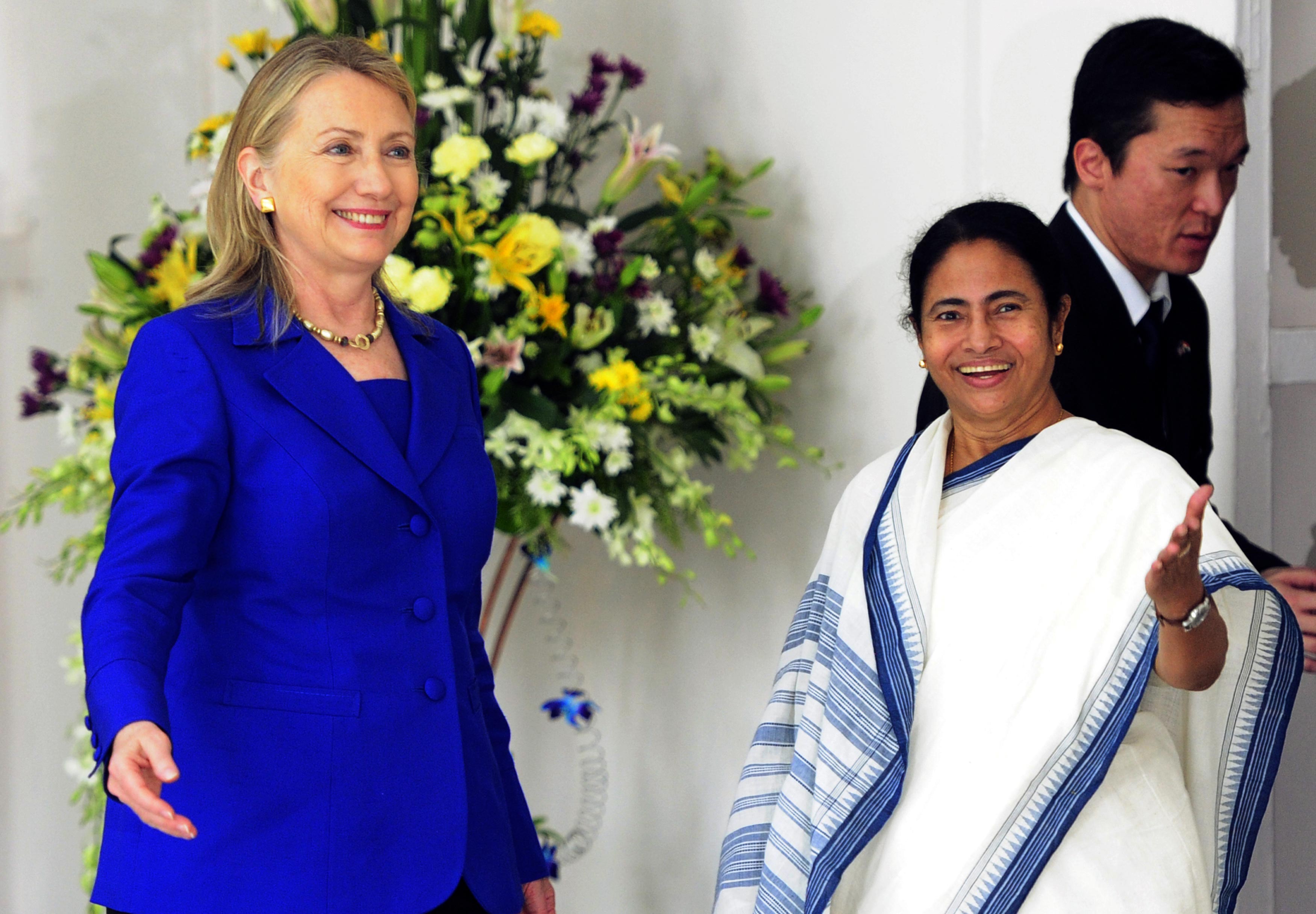
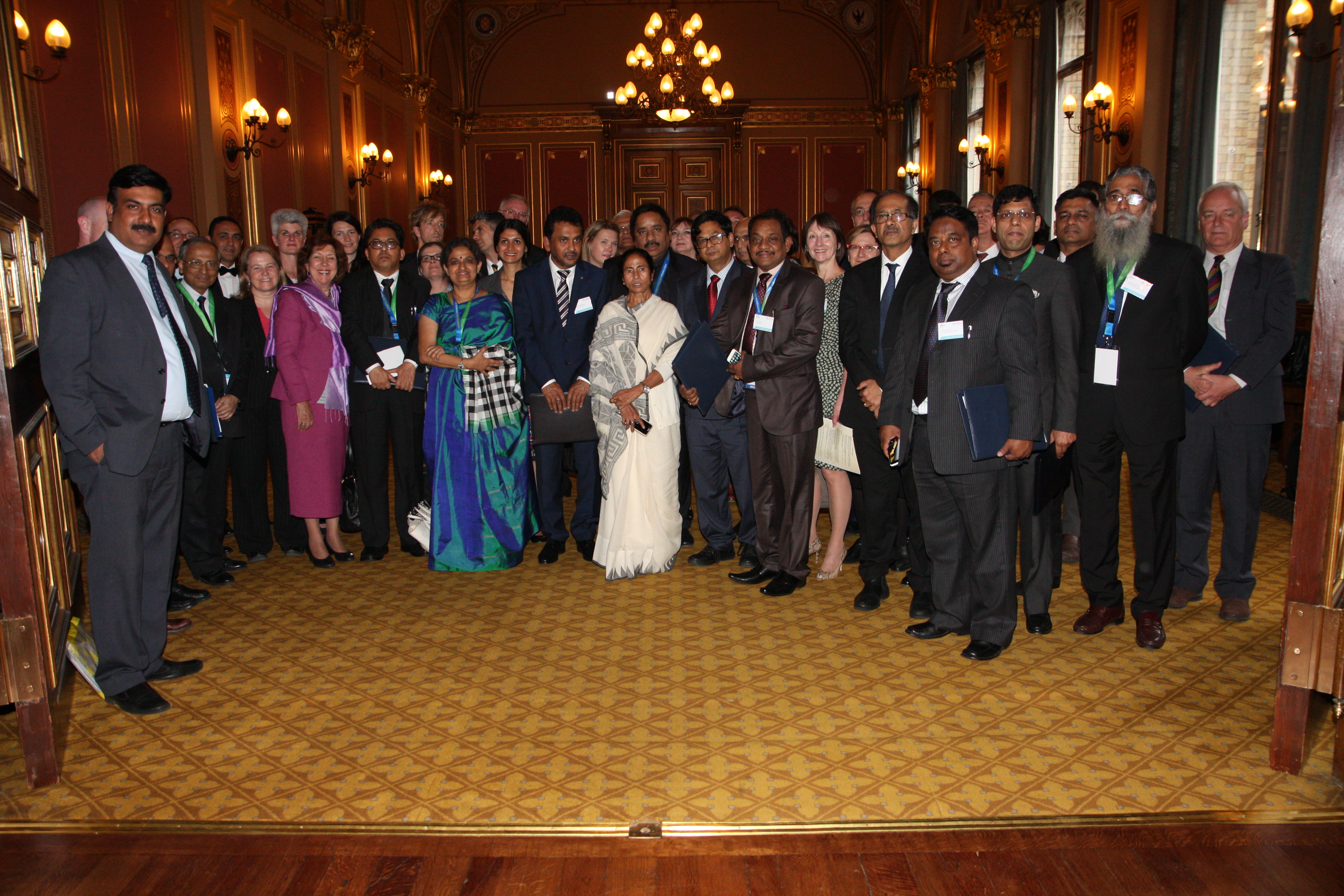
In the 2011 state assembly election, the All India Trinamool Congress, in alliance with the SUCI and the Indian National Congress, secured a decisive victory against the incumbent Left Alliance by securing 227 seats. The TMC alone won 184 seats, the INC secured 42, and the SUCI won one, effectively ending the 34-year rule of the world's longest-serving democratically elected Communist party.
Banerjee was sworn in as the first female Chief Minister of West Bengal on 20 May 2011. One of her immediate decisions was to return 400 acre (400 acre) of land to unwilling farmers in Singur, fulfilling a key promise from her long-standing protest. She stated that if Tata Motors still wished to, they could set up their factory on the remaining 600 acre (600 acre), otherwise her government would explore other options. She was also credited with establishing the Gorkhaland Territorial Administration, addressing long-standing demands for greater autonomy in the Darjeeling Hills.
During her first term, Banerjee initiated various reforms in the education and health sectors. Educational reforms included ensuring teachers' monthly pay was released on the first day of every month and expediting pensions for retiring teachers. In the health sector, she pledged a "three-phase developmental system" to enhance health infrastructure and services. On 30 April 2015, UNICEF India recognized Nadia district as the country's first Open Defecation Free district, a significant achievement under her administration.
Her government also played a role in the rollback of petrol price hikes and the suspension of FDI in the retail sector until a national consensus could be reached. To improve law and order, new police commissionerates were established in Howrah, Barrackpore, Durgapur-Asansol, and Bidhannagar, and the entire area of Kolkata Municipal Corporation was brought under the control of the Kolkata Police.
Banerjee showed a keen interest in promoting the state's history and culture. She named several stations of the Kolkata Metro after freedom fighters and planned to name future stations after religious leaders, poets, and singers. However, her administration faced criticism for introducing controversial stipends for imams (Imam Bhatta), which the Calcutta High Court later ruled unconstitutional.
On 16 February 2012, Bill Gates of the Bill & Melinda Gates Foundation commended the West Bengal government for achieving a full year without any reported cases of polio, recognizing it as a milestone for both India and the world. In June 2012, she launched a Facebook page to gather public support for A.P.J Abdul Kalam as her party's choice for the presidential elections. Although he declined to run for a second term, she eventually supported Pranab Mukherjee, stating she was personally a "great fan" of his. Despite having actively supported bandhs (work stoppages) while in opposition, she later opposed them as Chief Minister, admitting her past calls for them were a mistake. Her first term was also significantly impacted by the Saradha Scam, a financial embezzlement case that led to the imprisonment of her cabinet minister Madan Mitra and party MP Kunal Ghosh, with several other party members facing rigorous questioning.
3.2. Second term (2016-2021)
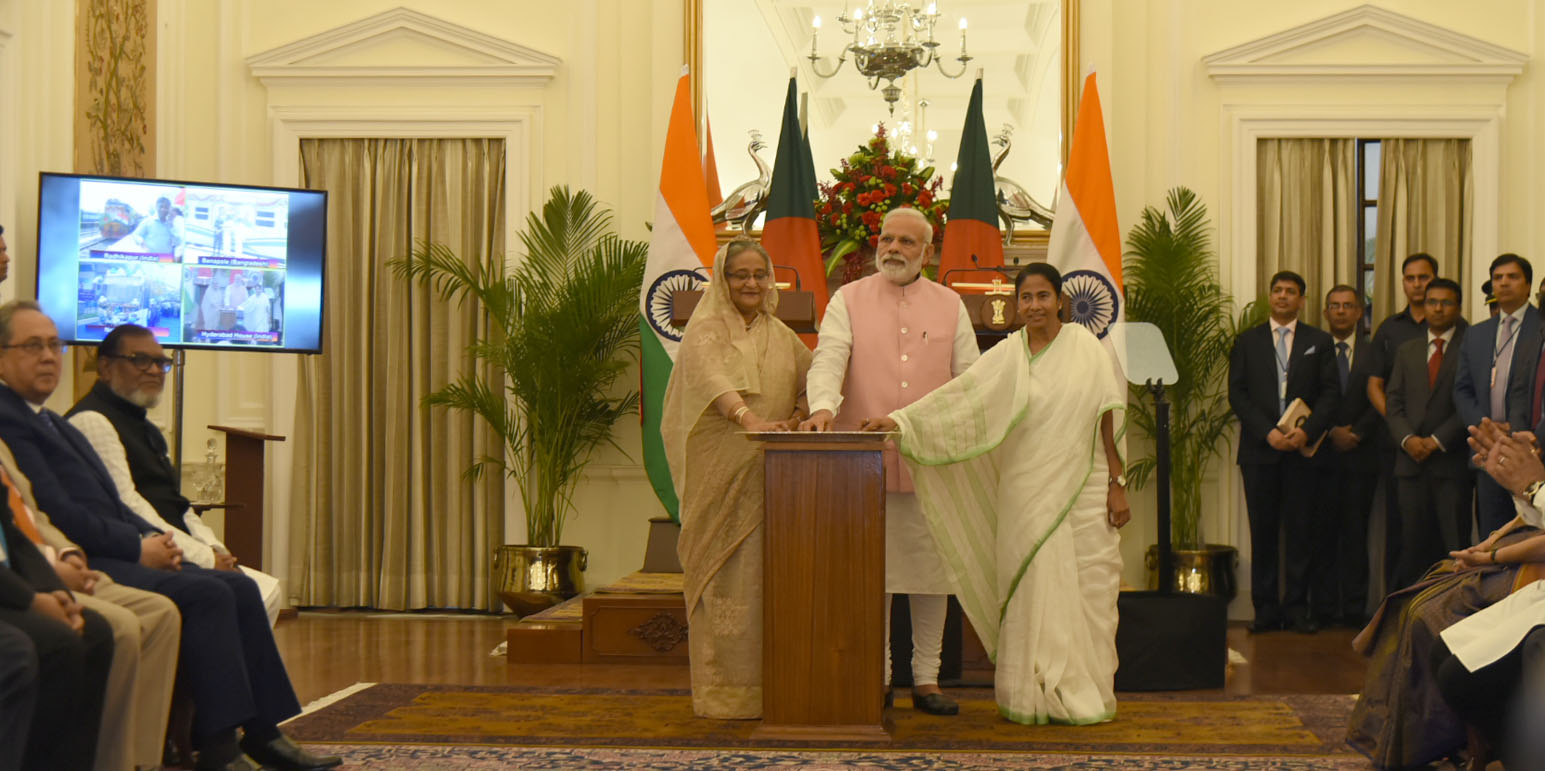

In the 2016 assembly elections, All India Trinamool Congress won with a landslide two-thirds majority under Mamata Banerjee winning 211 seats out of total 293, who has been elected as Chief Minister West Bengal for the second term. All India Trinamool Congress won with an enhanced majority contesting alone and became the first ruling party to win without an ally since 1962 in West Bengal.
In 2017 Kanyashree, a scheme launched by her government, was ranked the best by the United Nations among 552 social sector schemes from across 62 countries, highlighting its significant impact on social development and women's empowerment.
3.3. Third term (2021-present)
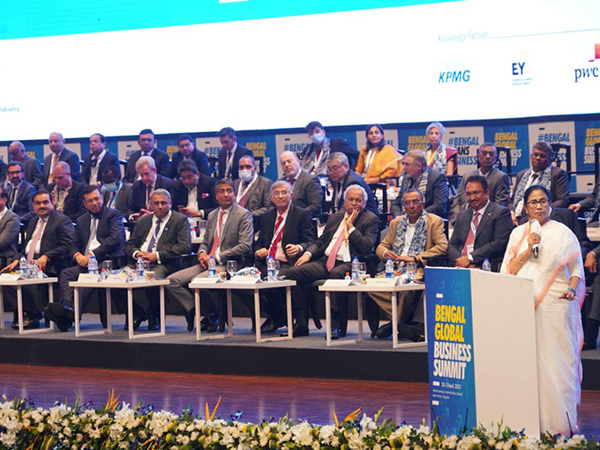
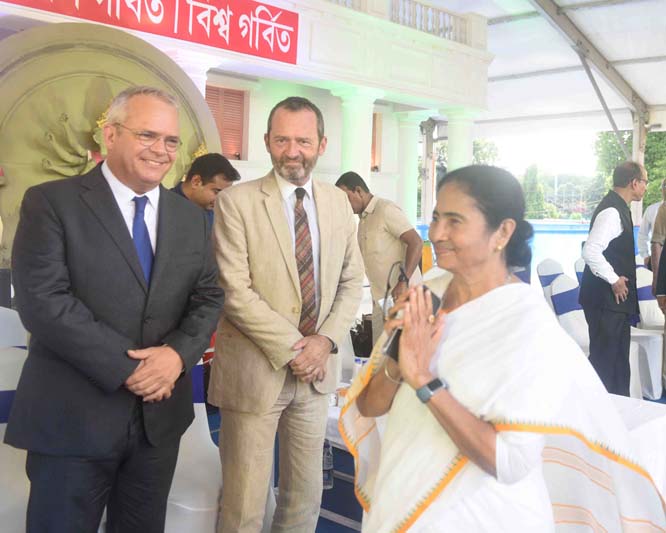
In the 2021 assembly elections, the All India Trinamool Congress again won a landslide two-thirds majority. However, Mamata Banerjee herself contested from the Nandigram assembly constituency and narrowly lost to the Bharatiya Janata Party's Suvendu Adhikari by 1,956 votes. She subsequently challenged this outcome in the Calcutta High Court, where the matter remains sub judice. Despite her personal defeat in Nandigram, her party secured 213 out of 292 seats, leading to her being elected as Chief Minister of West Bengal for a third term. She tendered her resignation to Governor Jagdeep Dhankhar at Raj Bhawan and was sworn in as Chief Minister on 5 May 2021. Later, her party won the remaining two seats, and she herself won the Bhabanipur by-election by a significant margin of 58,835 votes, taking oath as an MLA on 7 October.
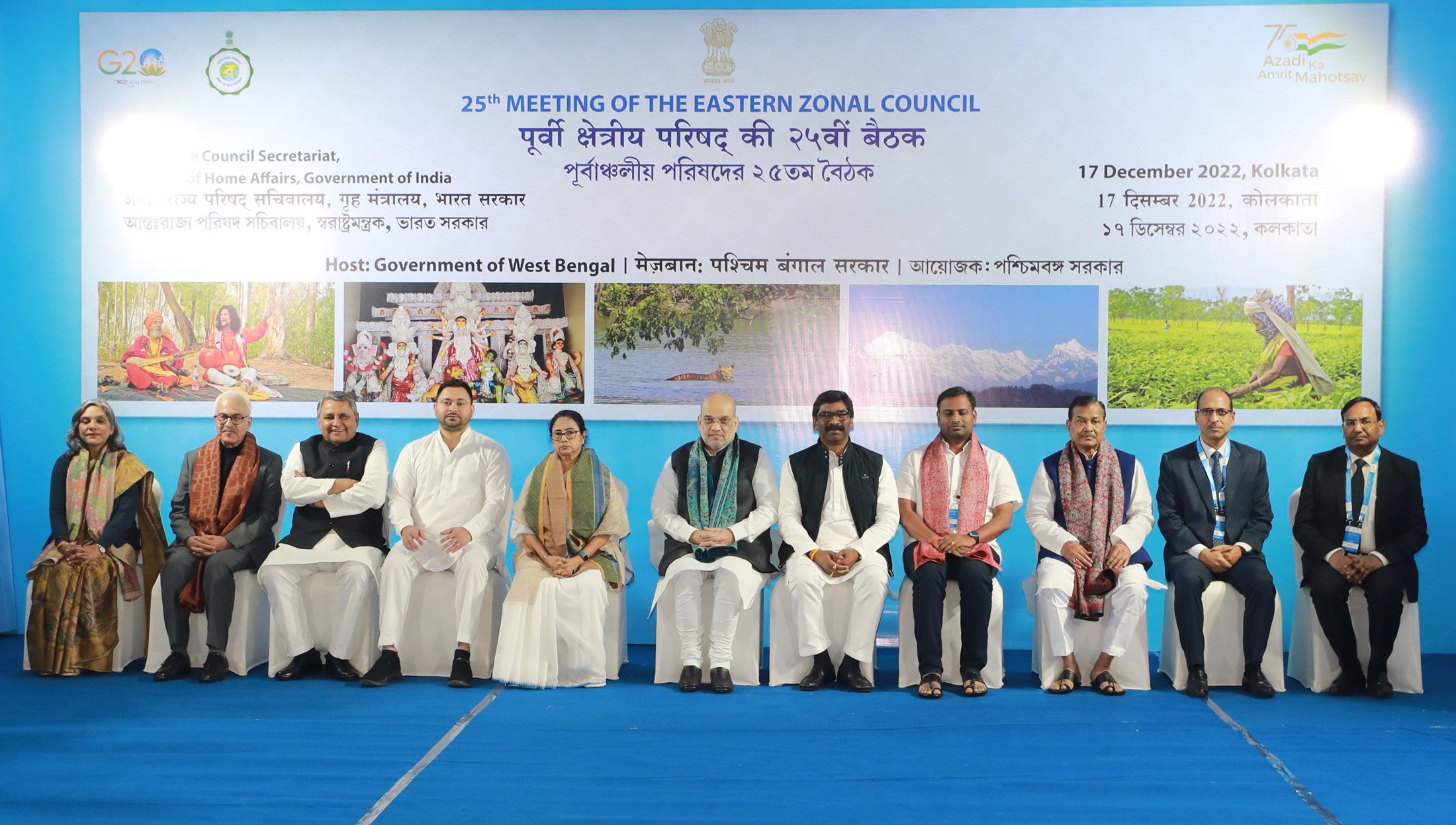
After winning the election, she launched the Lakshmir Bhandar scheme, fulfilling a key promise. This initiative provides basic financial assistance to women under 60, with 500 INR for general categories and 1.00 K INR for minorities. This scheme proved immensely popular and successful. Another significant initiative under her leadership was the Students Credit Card scheme, designed to provide financial loan support of up to 1.00 M INR to meritorious students who face financial barriers to pursuing higher education, with the West Bengal government acting as a guarantor.
As of 30 November 2021, Mamata Banerjee surpassed her immediate predecessor, Buddhadeb Bhattacharjee, to become the third-longest-serving Chief Minister of West Bengal. If she remains in office until at least 26 October 2025, she will become the second-longest-serving Chief Minister after Jyoti Basu, surpassing Bidhan Chandra Roy. Furthermore, if she remains in office until 16 May 2025, she would also become the second-longest-serving female Chief Minister in India, after Sheila Dikshit, superseding J. Jayalalithaa.
3.4. Policies and initiatives
As Chief Minister, Mamata Banerjee's government has pursued a range of policies and initiatives aimed at fostering social development, economic growth, and public welfare in West Bengal. Her administration has consistently emphasized programs targeting vulnerable populations, women's empowerment, and rural development.
Key policy areas and programs include:
- Land Return in Singur**: One of her very first decisions as Chief Minister was to facilitate the return of 400 acre (400 acre) of land to unwilling farmers in Singur. This move reversed a contentious land acquisition policy that had fueled widespread protests and marked a significant victory for farmers' rights.
- Gorkhaland Territorial Administration (GTA)**: Her government played a crucial role in the establishment of the GTA, a semi-autonomous administrative body for the Darjeeling hills, addressing long-standing demands for regional autonomy and bringing a period of peace to the region.
- Education Sector Reforms**: Initiatives included ensuring the timely release of teachers' monthly salaries on the first day of each month and expediting pension processing for retiring teachers, aiming to improve the working conditions and financial security of educators.
- Healthcare Improvements**: Banerjee's administration pledged a "three-phase developmental system" to upgrade health infrastructure and services across the state, with a focus on enhancing accessibility and quality of medical care.
- Open Defecation Free Status**: The government's efforts led to Nadia district becoming India's first Open Defecation Free district in 2015, a significant public health achievement that earned praise from UNICEF India.
- Kanyashree Prakalpa**: This flagship scheme, launched by her government, aims to improve the status and well-being of girls by providing financial assistance to prevent child marriage and encourage education. It received global recognition, being ranked the best among 552 social sector schemes by the United Nations in 2017.
- Lakshmir Bhandar**: Introduced in her third term, this scheme provides direct financial aid to women under 60, offering 500 INR monthly to general category beneficiaries and 1.00 K INR to women from minority communities. It quickly gained immense popularity and is a key social welfare program.
- Students Credit Card Scheme**: This initiative aims to provide financial support in the form of loans, up to 1.00 M INR, to meritorious students for higher education, with the state government acting as a guarantor. This program seeks to ensure that financial constraints do not hinder deserving students from pursuing their academic aspirations.
- Law and Order Reforms**: To enhance public safety and law enforcement, new police commissionerates were established in Howrah, Barrackpore, Durgapur-Asansol, and Bidhannagar. The entire area of Kolkata Municipal Corporation was also brought under the jurisdiction of the Kolkata Police.
- Cultural and Heritage Promotion**: Banerjee has shown a strong interest in raising public awareness about the state's rich history and culture. She initiated the naming of several Kolkata Metro stations after freedom fighters and planned to name upcoming stations after revered religious leaders, poets, and singers, thereby embedding historical and cultural references into public infrastructure.
3.5. Controversies and criticisms
Mamata Banerjee's tenure as Chief Minister has been marked by several significant controversies and criticisms, ranging from financial scandals to allegations concerning governance and public safety.
3.5.1. Financial scandals
During her time as Chief Minister, the Saradha Group financial scandal and the Rose Valley financial scandal came to light, leading to significant scrutiny of her administration and party members. These financial embezzlement cases resulted in the imprisonment of Madan Mitra, a former minister in her cabinet, and Kunal Ghosh, a party MP, while several other prominent party figures faced intense questioning.
Controversially, some of her paintings were sold to these firms, including one sold to Sudipto Sen (a central figure in the Saradha scam) for 18.00 M INR. Additionally, 20 more of her paintings were seized from other Saradha Group shareholders. These transactions came under the scrutiny of law enforcement agencies, raising questions about financial transparency.
Her administration also faced criticism for challenging the federal system of India when she ordered the arrest of CBI officials who had arrived in Kolkata to investigate the Saradha Group financial scandal. However, proponents of her government argued that the CBI's attempt to arrest the Kolkata Police Commissioner was an unwarranted attack on federalism, thereby justifying her administration's response.
3.5.2. Allegations of favoritism and misgovernance
Mamata Banerjee and her government have repeatedly faced accusations of "Muslim appeasement" from various groups, including opposition political parties. Critics point to initiatives such as controversial stipends for imams (Iman Bhatta), which were later ruled unconstitutional by the Calcutta High Court. The court ordered the West Bengal government to cease these monthly payments to thousands of imams and muezzins. In another instance, in October 2016, the West Bengal government banned Durga Puja festival immersions after 4:00 PM to accommodate the Muharram procession on the following day. This decision was widely perceived by a section of the population as another example of Banerjee's "Muslim Appeasement" policy. The Calcutta High Court overturned this decision, explicitly labeling it "a bid to appease minorities." However, her supporters contend that she works for all citizens and does not discriminate between Hindus and Muslims.
Her government was also widely criticized for its handling of the COVID-19 pandemic in West Bengal. The opposition and critics accused the administration of concealing facts and under-testing. For example, on 2 April 2020, while the state's health department initially confirmed seven COVID-19 deaths, this figure was swiftly revised to three. Non-resident Bengali doctors penned an open letter alleging "gross under-testing and misreporting of Covid data," noting that West Bengal had conducted significantly fewer tests per million compared to the national average, despite having ample testing capacity. The government was also criticized for not sending enough samples to the National Institute of Cholera and Enteric Diseases (NICED) for testing. In response, the government banned the use of cellphones in hospitals. Conversely, Mamata Banerjee vehemently blamed the BJP's IT cell for "using fake news to malign West Bengal's health department," leading to arrests for spreading misinformation during the lockdown, including an FIR against a Bengal BJP MP for allegedly raising "false alarm" over COVID-19 deaths.
In August 2024, Banerjee was widely criticized for her government's handling of the rape and murder of a young trainee doctor at R. G. Kar Medical College and Hospital in Kolkata. She faced accusations of attempting to cover up the incident and protect the now-ex-principal, Sandip Ghosh, whose involvement is currently under investigation by the CBI. The victim's parents publicly questioned Banerjee's role, stating they were not satisfied with her actions and that their daughter might still be alive had there been proper intervention.
In February 2024, the 2024 Sandeshkhali violence gained significant attention when several women in Sandeshkhali village alleged sexual assault and rape by local Trinamool Congress leaders, including Sheikh Shahjahan, Uttam Sardar, and Shibu Hazra. BJP leaders strongly criticized Mamata Banerjee for her perceived silence on the crimes and for allegedly protecting the accused politicians. Furthermore, TMC leader Partha Bhowmick, after visiting Sandeshkhali, claimed that the assault allegations were fabricated. Sheikh Shahjahan, who had been absconding after an attack on Enforcement Directorate officers by his supporters during an attempt to arrest him on corruption charges, was eventually apprehended by police from Minakhan, North 24 Parganas on 29 February 2024.
4. Personal life and public image
Throughout her extensive political career, Mamata Banerjee has consistently maintained a publicly austere lifestyle. She is known for dressing in simple, traditional Bengali cotton sarees, often referred to as 'tant' sarees, and is noted for her avoidance of cosmetics or elaborate jewelry. She has remained unmarried throughout her life.
Her personal interactions with other public figures often reveal unique facets of her character. Despite their strong political differences, Prime Minister Narendra Modi once claimed in April 2019 that Banerjee sends him her own selected kurtas and sweets annually. Similarly, Australian Envoy Barry O'Farrell publicly thanked her for sending him traditional Bengali sweets on the occasion of Vijayadashami. In September 2019, Banerjee met Jashodaben Modi, the wife of Prime Minister Modi, at the Kolkata airport and presented her with a saree.
Banerjee identifies herself as a Hindu. While appealing for maintaining religious harmony, she has frequently reiterated her belief that "Religion is personal, but festivals are universal." This statement reflects her stance on secularism and inclusive cultural practices.
Her personal courage and dedication have also been highlighted by colleagues. In 2021, Yashwant Sinha, a prominent politician, revealed that Mamata Banerjee had offered herself as a hostage during the Kandahar hijacking crisis as part of a negotiation strategy. Sinha lauded her, stating, "She was ready to make the ultimate sacrifice for the country." During the COVID-19 lockdown, Banerjee was seen stepping out into the streets of Kolkata herself to spread awareness among the common people, urging them to maintain social distancing and adhere to safety protocols, demonstrating her direct engagement with public well-being.
5. Literary and artistic works
Mamata Banerjee is a prolific author, with numerous books published to her credit. In 2022, she was honored with the Paschimbanga Akademy Award for her literary contribution, specifically for 'Kabita Bitan,' a collection comprising 946 poems.
Beyond her literary pursuits, she is also a self-taught painter. Her paintings have been featured in several exhibitions and have been auctioned multiple times. Notably, 300 of her paintings were collectively sold for 90.00 M INR.
She is also recognized as a lyricist, with many of her compositions revolving around themes of 'Durga Puja' and 'Motherland.' Her song 'Maa Go Tumi Sarbojanin,' sung by renowned playback singer Shreya Ghoshal, is one of her most popular lyrical works.
6. Awards and recognition
Mamata Banerjee has received several significant awards and recognitions throughout her career, acknowledging her influence and contributions.
In 2012, Time magazine included her in its "100 Most Influential People in the World" list, recognizing her as a populist leader. In September 2012, Bloomberg Markets magazine featured her among the 50 most influential people in the world of finance, highlighting her impact on economic policy. She was conferred the Skoch Chief Minister of the Year Award in 2018 for her governance achievements.
In September 2021, Time magazine again published its annual list of 'The 100 Most Influential People of 2021,' which prominently featured Mamata Banerjee, reaffirming her global standing. In August 2021, she received an invitation to attend the prestigious World Meeting for Peace in Rome, where she would have been the only Indian participant alongside figures like Pope and Angela Merkel. However, in September, the Union Ministry of External Affairs (MEA) denied her permission to attend, stating that the event's status was not "commensurate in status for participation by the chief minister of a state." This decision drew strong criticism, including from BJP MP Subramanian Swamy, who questioned the legal basis for the denial, and former Indian Diplomat K. P. Fabian, who found the MEA's reason unconvincing. Similarly, in December, Banerjee was denied permission by the MEA to visit Nepal.
The Bengali film Baghini, released on 24 May 2019, was inspired by Mamata Banerjee's life, though it is not a direct biopic.
7. Electoral history
Mamata Banerjee has a notable electoral history, having contested and won several elections for both the Lok Sabha (lower house of the Indian Parliament) and the West Bengal Legislative Assembly.
7.1. Lok Sabha elections
| Year | Constituency | Party | Votes | % | Result |
|---|---|---|---|---|---|
| 1984 | Jadavpur | Indian National Congress | 331,618 | 50.87 | Won |
| 1989 | Jadavpur | Indian National Congress | 410,288 | 46.67 | Lost |
| 1991 | Kolkata Dakshin | Indian National Congress | 367,896 | 52.46 | Won |
| 1996 | Kolkata Dakshin | Indian National Congress | 438,252 | 52.50 | Won |
| 1998 | Kolkata Dakshin | All India Trinamool Congress | 503,551 | 59.37 | Won |
| 1999 | Kolkata Dakshin | All India Trinamool Congress | 469,103 | 58.26 | Won |
| 2004 | Kolkata Dakshin | All India Trinamool Congress | 393,561 | 51.10 | Won |
| 2009 | Kolkata Dakshin | All India Trinamool Congress | 576,045 | 57.19 | Won |
7.2. West Bengal Legislative Assembly elections
| Year | Constituency | Party | Votes | % | Result |
|---|---|---|---|---|---|
| 2011 | Bhabanipur | Trinamool Congress | 73,635 | 77.46 | Won |
| 2016 | Bhabanipur | Trinamool Congress | 65,520 | 47.67 | Won |
| 2021 | Nandigram | Trinamool Congress | 108,808 | 47.64 | Lost |
| 2021^ | Bhabanipur | Trinamool Congress | 85,263 | 71.90 | Won |
^By-election